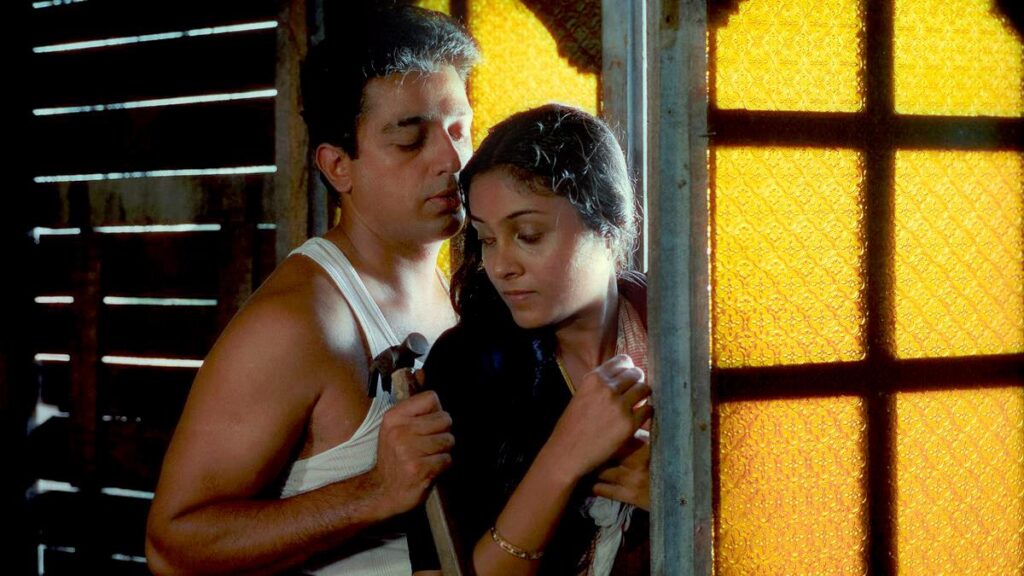The gangster saga Nayakan not only earned Mani Ratnam’s reputation as a great director, the dubbed version of the film also did well in Mumbai, so much so that Feroz Khan’s Hindi remake, Dayavan, starring Vinod Khanna, could not compare, recalls Deepa Gahlot.

IMAGE: Saranya Ponvannan and Kamal Haasan in Nayakan.
Nearly four decades have passed between the release of Nayakan (1987) and Thug Life (2025). This small fact is noteworthy because Mani Ratnam has teamed up with Kamal Haasan after so many years, and again for a gangster film.
It had been over a decade since the Hollywood classic The Godfather (1972), but the Francis Ford Coppola film, based on the best selling Mario Puzo novel, had left a deep impact, not just on American movies, but all over the world.
Ratnam took plot points and a few scenes from that film, and placed it so deeply and authentically into Tamil culture that the source did not matter.
That was also the time when the media had made heroes out of underworld dons. Names like Haji Mastan, Karim Lala, Varadarajan Mudaliar, Sukur Narayan Bakhia, Bada Rajan, Chhota Rajan, Manya Surve, Arun Gawli and that young upstart Dawood Ibrahim were household names.
Their flamboyant lifestyles and Robin Hood pretensions were glamourised.
Crime reporters boasted of access and exclusivity with the ‘Bhais’; their lives — or at least the true or embellished stories about them — can be seen in several movies.

IMAGE: Kamal Haasan in Nayakan.
Ratnam picked Vardadarajan Mudaliar as his inspiration because he was Tamil-speaking, ruled out of Dharavi in central Mumbai, which had a large population of migrants from Tamil Nadu, and, when he did start his own kangaroo courts to settle disputes and acquired political power, his legend grew.
Unemployed young men, who were attracted to the world of crime, were easily absorbed into extortion, gambling, land grabbing, smuggling and bootlegging rackets.
Unlike terrorism and drug trafficking today, these crimes did not directly affect law-abiding middle class readers of newspapers and magazines, and the benevolent don legends easily took root.
Mudaliar’s lavish Ganpati pandal was a major attraction every year.
These gang leaders’ influence snaked into politics and Bollywood. The biggest stars had to dance at the gangsters’ parties, or have their careers wrecked. At some point, the cops were woken out of their lethargy.
Till then, with organised crime running mostly unchecked, it was easy to portray cops as corrupt hoodlums.

IMAGE: Saranya Ponvannan and Kamal Haasan in Nayakan.
Ratnam’s character Sakthivel ‘Velu’ Naikar runs away from Tamil Nadu after killing an evil cop, and finds shelter in the teeming shanty town of Dharavi, where it is possible for a kid to vanish.
He is given shelter by a smuggler, Hussain, who is arrested by a corrupt cop and killed in jail. His death is passed off as suicide.
A furious Velu murders the cop, Kelkar (Pradeep Shakthi) and in a powerful scene in the film, none of the witnesses come forward to name him.
He later looks after Kelkar’s wife and mentally-challenged son, Ajit.
His power grows over time.
He cares for his people, and runs a parallel system of governance to solve their problems. The scene in which he forces a doctor to treat a patient, who was being ignored by the hospital, was copied in many films.
Such a rapid rise brings out rivals and in an attack on Velu, his wife, Neela (Saranya) is killed, which leads to Velu running a savage reprisal.
Velu sends away his children Surya and Charumathi to safety in Chennai.

IMAGE: Kamal Hassan in Nayakan.
Velu becomes one of the more feared as well as the most popular gangsters in Mumbai.
A grown-up Surya (Nizhalgal Ravi) and Charumathi (Karthika) return home, and Surya follows in his father’s footsteps, which leads to his death. Charumati blames Velu and leaves home.
A new ACP Patil (Nasser) takes on a mission to eliminate organised crime, which brings him into direct conflict with Velu.
Velu is surprised to learn that his daughter is married to the cop, and has a son, Sakthivel, named after her father.
When Velu’s allies are arrested, he surrenders to the cops, to save them from torture.
But no evidence is found against Velu, because nobody — not even Kelkar’s wife — comes forward to testify against him.

IMAGE: Saranya Ponvannan and Kamal Haasan in Nayakan.
In real life, the cops had shut down Varadarajan’s criminal business, which drove him out of Mumbai, to Tamil Nadu.
For a Mani Ratnam film that built the character of Velu Nayakan to mythic proportions, this ending would be downbeat. Velu’s death is dramatic and in the end, he pays for his crimes, one way or another.
Before Nayakan, Ratnam had made five films. But this gangster saga not only earned him his reputation as a great director, the dubbed version of the film also did well in Mumbai, so much so that Feroz Khan’s Hindi remake, Dayavan, starring Vinod Khanna, could not compare.
Now years later, Kamal Haasan is back in Mani Ratnam’s Thug Life, playing a gangster called Sakthivel.
The profile of the criminal has changed, and urban life has changed.
Has the audience changed too?


